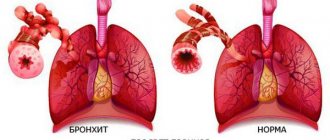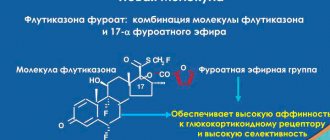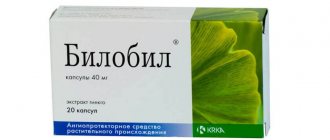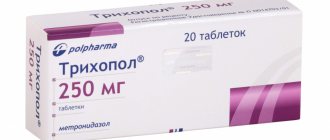pharmachologic effect
Pharmacological action - multivitamin, normalizing metabolic processes.
Retinol stimulates epithelialization, is necessary for the growth of bones and cartilage, and the synthesis of rhodopsin. Thiamine as thiamine pyrophosphate catalyzes carbohydrate metabolism and affects the functioning of the nervous system. Riboflavin activates tissue respiration; pyridoxine - exchange of amino acids, histamine, neurotransmitters. Cyanocobalamin is involved in the process of hematopoiesis and myelin synthesis; nicotinamide - in the processes of tissue respiration, carbohydrate and fat metabolism; ascorbic acid - in redox processes, the formation of corticosteroids, hemoglobin, maturation of red blood cells, collagen, dentin, blood clotting, increases nonspecific immunoresistance, and together with rutin reduces tissue permeability. Tocopherol has antioxidant activity, stimulates the synthesis of heme and proteins, the processes of tissue respiration and proliferation. Folic acid ensures the normal course of amino acid, nucleic acid, and choline metabolism and is necessary for normal hematopoiesis; calcium pantothenate - for the synthesis of acetylation coenzyme.
Composition and form of the complex
Undevit is available in the form of tablets for oral administration: bright yellow, spherical in shape, with a smooth surface, and sour-sweet in taste. The pills are packaged in 50 pieces in white plastic bottles with screw caps. The composition and recommendations for use are printed on the labels of the complex.
The composition of one dragee includes:
- fat-soluble vitamins A and E;
- ascorbic acid;
- routine;
- B vitamins: thiamine, riboflavin, niacin, D-calcium pantothene, pyridoxine, folate, cyanocobalamin.
Excipients and carriers of the active elements of the drug: peppermint oil, wax, starch, talc.
How to take Undevit
To prevent hypovitaminosis, as well as when prescribing the drug to adolescents, it is necessary to take 1 tablet per day: after meals or simultaneously with it, swallowing the pill whole. The best time to take vitamins is breakfast.
With complex therapy and with severe vitamin deficiency, adults can take 2-3 tablets, but not more than 1 piece. once. It is allowed to take vitamins with any drinks except carbonated and alcoholic drinks.
Course duration: 20–30 days. Repeated use is possible after a break of several weeks. It is important to remember that Undevit contains a large amount of fat-soluble vitamins that accumulate in the body. For this reason, it is undesirable to take other sources of tocopherol and vitamin A at the same time.
In women using oral contraceptives, their effect may be reduced while taking multivitamins. Undevit also reduces the duration of action of some antibiotics and glucocorticoid hormones.
Contraindications and side effects
You should not take a vitamin remedy if you have a stomach ulcer, gastritis with high acidity, severe renal or liver failure. It is also necessary to postpone administration in case of diarrhea and other acute intestinal lesions, the development of allergies: the appearance of skin itching, urticaria, swelling of the mucous membranes, bronchospasm.
The drug is not recommended for children under 14 years of age due to the high dosage of some components, more suitable for adults.
After a single or regular overdose of pills, heartburn, nausea, stomach cramps, and increased gas formation may occur. Therefore, you need to treat the drug Undevit as a medicine: do not neglect the recommendations for use in the instructions.
Vitamins Undevit: what are they useful for: reviews
Ilona, 56 years old:
After 50, problems with joints and spine began. I went to the doctor, who advised me to take Undevit vitamins. I drank them morning and evening for a month. Thanks to this, I felt a surge of energy and a general improvement in my condition. I noticed that my vision and mood improved. There were no adverse reactions, although I was prone to allergic manifestations.
Svetlana, 52 years old:
After I tried this complex, I can safely recommend it to women over 50. Firstly, it has a low cost. It has a good composition, helps strengthen the immune system, and secondly, it tastes good.
special instructions
To prevent the development of hypervitaminosis, it is not recommended to combine the intake of several multivitamin complexes. During a preventive or therapeutic course, urine turns yellow, which is explained by the presence of riboflavin among the constituent components of the vitamin complex. Taking the drug does not affect concentration and the ability to operate machinery and vehicles.
- How can you quickly lose 5 kg in a month?
- How to use tampons for girls and women
- Five-minute strawberry jam for the winter
Undevit-KV dragee No. 50
Name
Undevit-KV others in containers (bans) No. 50 in pack No. 1
Release form
Dragee
pharmachologic effect
Pharmacodynamics
Multivitamin medicine. Refers to drugs that regulate metabolic processes. Normalizes metabolism, including during the aging process. The pharmacological effect of the drug is determined by the active substances included in its composition. Vitamin A (retinol) plays a key role in the synthesis of enzyme proteins and structural components of tissues, is necessary for the formation of epithelial cells, bones and the synthesis of rhodopsin (visual pigment), supports the division of immunocompetent cells, the normal synthesis of immunoglobulins and other factors of protection against infections. Vitamin E (α-tocopherol acetate) is a fat-soluble vitamin that exhibits high antioxidant and radioprotective effects, protects cell membranes from damage by free radicals, takes part in the biosynthesis of heme and proteins, cell proliferation and other important processes of cellular metabolism. Vitamin E improves oxygen consumption by tissues. Shows angioprotective effect, affecting the tone and permeability of blood vessels, stimulating the formation of new capillaries. Vitamin B1 (thiamine hydrochloride) is an important coenzyme in the metabolism of carbohydrates and takes part in the functioning of the nervous system. Vitamin B2 (riboflavin) is an important catalyst for the processes of cellular respiration and visual perception. Vitamin B6 (pyridoxine hydrochloride) as a coenzyme takes part in protein metabolism and the synthesis of neurotransmitters. Vitamin B12 (cyanocobalamin) is a growth factor, necessary for the normal course of hematopoiesis and red blood cell maturation, and takes part in the synthesis of amino acids, nucleic acids and myelin. Vitamin C (ascorbic acid) takes part in the redox processes of the body, the synthesis of hemoglobin, affects the metabolism of amino acids, accelerates the absorption of iron from the gastrointestinal tract, increases the nonspecific resistance of the body, is necessary for the growth and formation of bones, skin, teeth and for normal functioning of the nervous and immune systems. Vitamin PP (nicotinamide) takes part in the processes of tissue respiration, carbohydrate and lipid metabolism. Folic acid stimulates erythropoiesis and takes part in the synthesis of amino acids and nucleic acids. Rutin normalizes capillary permeability, strengthens vascular walls, reduces platelet aggregation, exhibits antioxidant properties, prevents oxidation and promotes the deposition of ascorbic acid in tissues. Calcium pantothenate is part of coenzyme A and is necessary for the normal formation of the tricarboxylic acid cycle, the synthesis of ATP (adenosine triphosphate), the production of hormones and antibodies, the synthesis of acetylcholine, and the absorption of potassium ions, glucose, and vitamin E from the intestines.
Pharmacokinetics
After oral administration, the drug is well absorbed from the small intestine into the systemic circulation and penetrates into all organs and tissues. Clinical characteristics.
Indications for use
As a preventive and therapeutic agent for improving metabolic processes and general condition in people of working age and the elderly, including premature aging, asthenic syndrome, as well as during the period of convalescence after infectious diseases, in the postoperative period, after long-term therapy with broad-spectrum antibiotics.
Directions for use and doses
The drug is prescribed to adults and children over 14 years of age orally, after meals: for prophylactic purposes - 1 tablet 2 times a day, for treatment - 2 tablets 3 times a day for 20-30 days. Repeated courses should be carried out after 1–3 months. During pregnancy, to prevent the risk of a teratogenic effect, the daily dose of the drug should not exceed 1 tablet per day. The course of treatment depends on the severity and course of the disease and is determined by the doctor individually. Children. The use of the drug is contraindicated for children under 14 years of age.
Use during pregnancy and lactation
Use during pregnancy or breastfeeding is possible only taking into account the benefit to the mother over the potential risk to the fetus/child. During pregnancy, to prevent the risk of a teratogenic effect, the daily dose of the drug should not exceed 1 tablet per day. The dose of vitamin A should not exceed 5,000 IU for pregnant women and women planning to become pregnant. Large doses of retinol (over 10,000 IU) should not be used by women during breastfeeding due to the risk of developing hypervitaminosis A in infants.
Precautionary measures
When using the drug, it is necessary to observe the dosage and duration of the course of use. The drug should be used with caution in patients with diabetes mellitus, degenerative heart diseases, cardiac decompensation and coronary heart disease, diseases of the hematopoietic organs, impaired iron metabolism (hemosiderosis, hemochromatosis, thalassemia), gastrointestinal diseases, peptic ulcers. and duodenum in history, cholelithiasis, chronic pancreatitis, liver damage, patients with acute nephritis, urolithiasis, glaucoma, hemorrhages, moderate arterial hypotension. When using the drug, monitoring of blood pressure and kidney condition is necessary. Use with caution in patients with neoplasms (except for cases accompanied by megaloblastic anemia). It should be taken into account that the use of ascorbic acid in high doses may change some laboratory parameters (blood glucose, transaminases, uric acid, creatinine). The simultaneous use of ascorbic acid with an alkaline drink reduces its absorption, so you should not drink the drug with alkaline mineral water. Do not use the medicine with hot drinks (especially coffee), alcohol. It is not recommended to use the drug at the end of the day, since ascorbic acid has a slight stimulating effect. Do not exceed the recommended dose. When using the drug, like other multivitamin preparations, you need a complete protein diet that promotes better absorption and metabolism of vitamins, especially water-soluble ones. Women who have used high doses of retinol (more than 10,000 IU) can plan pregnancy no earlier than 6-12 months later. This is due to the fact that during this time there is a risk of abnormal development of the fetus under the influence of high levels of vitamin A in the body. The drug contains sugar, which should be taken into account in patients with diabetes. The drug is not recommended to be prescribed together with other multivitamins, since an overdose of the latter in the body is possible. The drug contains wheat flour as an excipient, which should be taken into account by patients with celiac disease. Urine may turn yellow, which is completely harmless and is explained by the presence of riboflavin in the drug.
Interaction with other drugs
Vitamins A and E mutually enhance the effect and are synergists. Vitamin A reduces the anti-inflammatory effect of glucocorticoids. It cannot be used simultaneously with nitrites and cholestyramine, as they interfere with the absorption of retinol. Vitamin A should not be prescribed with retinoids, as their combination is toxic. Vitamin E should not be used together with iron, silver, alkaline agents (sodium bicarbonate, trisamine), or indirect anticoagulants (dicoumarin, neodicoumarin). Vitamin E enhances the effect of steroidal and non-steroidal anti-inflammatory drugs (sodium diclofenac, ibuprofen, prednisolone). Medicines containing iron inhibit the effect of vitamin E. Vitamin C enhances the effect and toxicity of sulfonamides (possibility of crystalluria), penicillin, increases the absorption of iron, the absorption of aluminum (take into account during simultaneous treatment with antacids containing aluminum), reduces the effectiveness of heparin and indirect coagulants. Large doses of the drug reduce the effectiveness of tricyclic antidepressants, neuroleptics - phenothiazine derivatives, tubular reabsorption of amphetamine, and interfere with the excretion of mexiletine by the kidneys. Ascorbic acid can be used only 2 hours after the injection of deferoxamine. Long-term use of large doses of the drug reduces the effectiveness of treatment with disulfiram. Ascorbic acid increases the overall clearance of ethyl alcohol. Ascorbic acid increases the excretion of oxalates in the urine and increases the risk of crystalluria during treatment with salicylates. The absorption of vitamin C is reduced when used simultaneously with oral contraceptives, consumption of fruit or vegetable juices, and alkaline drinking. Folic acid, when used simultaneously with antithrombotic drugs, increases the risk of bleeding, with antihypertensive drugs - leads to increased arterial hypotension, with lipid-lowering drugs - increases the risk of their toxic effects, with antidiabetic drugs - reduces the glucose-lowering effect of the latter, with methyldopa or beta blockers. adrenergic receptors - leads to a significant decrease in blood pressure, with probenecid - reduces the effect of probenecid. Folic acid reduces plasma concentrations of phenytoin; when used with other antiepileptic drugs, a mutual decrease in clinical effectiveness is possible. Vitamin B6 weakens the effect of levodopa, prevents or reduces the toxic effects observed with the use of isoniazid and other anti-tuberculosis drugs. Vitamin B1, influencing polarization processes in the area of neuromuscular synapses, can weaken the curare-like effect of muscle relaxants. Vitamin B2 is incompatible with streptomycin and reduces the effectiveness of antibacterial drugs (oxytetracycline, doxycycline, erythromycin, tetracycline and lincomycin). Tricyclic antidepressants, imipramine and amitriptyline, inhibit the metabolism of riboflavin, especially in cardiac tissue. PAS (para-aminosalicylic acid), cimetidine, calcium supplements, ethyl alcohol reduce the absorption of vitamin B12. Prescribe with caution to patients with angina, unstable angina and acute myocardial infarction, patients receiving nitrates, calcium channel antagonists and beta blockers. Cases of rhabdomyolysis have been reported when nicotinic acid was used with lovastatin.
Contraindications
Hypersensitivity to any components of the drug, nephrolithiasis, severe renal dysfunction, chronic glomerulonephritis, gout, hyperuricemia, erythremia, erythrocytosis, tendency to thrombosis, thrombophlebitis, thromboembolism, thyrotoxicosis, chronic heart failure, history of sarcoidosis, active peptic ulcer of the stomach and duodenum (due to a possible increase in the acidity of gastric juice), severe liver dysfunction, active hepatitis, neoplasms (except for cases accompanied by megaloblastic anemia), arterial hypertension (severe forms), hypervitaminosis A and E, impaired iron and copper metabolism, hypercalcemia, fructose intolerance, glucose-galactose malabsorption syndrome.
Compound
Active ingredients: 1 tablet contains vitamin A (in the form of vitamin A palmitate) - 3300 MO (1.817 mg) or vitamin A (in the form of retinol acetate) - 3300 MO (1.135 mg), vitamin E (in the form of α-tocopherol acetate) - 10 mg, vitamin B1 (in the form of thiamine hydrochloride) - 2 mg, vitamin B2 (riboflavin) - 2 mg, vitamin B6 (pyridoxine hydrochloride) - 3 mg, vitamin B12 (cyanocobalamin) - 2 mcg, vitamin C (ascorbic acid) - 75 mg, nicotinamide - 20 mg, folic acid - 0.07 mg, rutin - 10 mg, calcium D-pantothenate - 3 mg, excipients: wheat flour, starch syrup, talc, light mineral oil, sugar, yellow wax, flavoring "mint aroma"
Overdose
In case of an overdose of the drug, dyspeptic symptoms (nausea, vomiting, diarrhea, epigastric pain), allergic reactions (itching, skin rash), changes in the skin and hair, liver dysfunction, headache, drowsiness, lethargy, facial flushing, irritability. In such cases, the use of the drug should be discontinued. Therapy is symptomatic. With long-term use of vitamin C in large doses, it is possible to inhibit the function of the insular apparatus of the pancreas, change the renal secretion of ascorbic and uric acids during acetylation of urine with the risk of precipitation of oxalate stones.
Side effect
When using the drug in recommended doses, the following adverse reactions are possible. From the immune system: hypersensitivity reactions to the components of the drug, including anaphylactic shock, angioedema, bronchospasm; from the cardiovascular system: arterial hypertension; from the skin and subcutaneous tissues: rash, urticaria, itching, redness; from the gastrointestinal tract: dyspeptic disorders, nausea, vomiting, stomach pain, belching, constipation, diarrhea, increased secretion of gastric juice; from the nervous system: headache, dizziness, increased excitability, drowsiness, sleep disturbance, increased fatigue; from the organs of vision: blurred vision, dry skin/mucous membranes of the eyes; from the metabolic side: hypercalcemia, hypercalciuria, crystalluria, glucosuria; from the blood and lymphatic system: blood coagulation disorders, hemolysis of erythrocytes in patients with glucose-6-phosphate dehydrogenase deficiency; general disorders: hot flashes, which may be accompanied by a feeling of palpitations, irritability, sweating, hyperthermia; others: yellow coloration of urine. During long-term use of high doses, the following adverse reactions may occur. Metabolism: hyperuricemia, impaired glucose tolerance, hyperglycemia, impaired zinc and copper metabolism; from the nervous system: paresthesia, convulsions, anorexia; from the cardiovascular system: arrhythmias, arterial hypotension; from the blood and lymphatic system: erythrocytopenia, neutrophilic leukocytosis; from the gastrointestinal tract: gastrointestinal disorders; from the skin and subcutaneous tissues: hair loss, seborrhea, hyperpigmentation, dryness and cracks on the palms and soles; from the kidneys and urinary tract: impaired renal function, renal failure; from the liver and biliary tract: jaundice, fatty liver; from the musculoskeletal and connective tissue side: myalgia, myopathy; laboratory data: temporary increase in the level of aspartate aminotransferase, alkaline phosphatase, lactate dehydrogenase, increase in the level of uric acid in the blood, electrolyte imbalance.
Storage conditions
Store in original packaging at a temperature not exceeding 25 °C. Keep out of the reach of children.
Buy Undevit-KV etc. in containers (bans) No. 50 in pack No. 1 in the pharmacy
Price for Undevit-KV etc. in containers (bans) No. 50 in pack No. 1
Instructions for use for Undevit-KV etc. in containers (bans) No. 50 in pack No. 1
Drug interactions
Vitamins are involved in humoral regulation and are highly active compounds, so they interact with many medications. Before taking a multivitamin complex, you should familiarize yourself with the possible consequences of taking other medications at the same time:
| Substance | Result of interaction |
| Glucocorticoids, corticosteroids | The anti-inflammatory effect is reduced by retinol |
| Retinoids | Not recommended to be combined with vitamin A |
| Cholestyramine, nitrites | Absorption of retinol is impaired |
| Silver- and iron-containing preparations, products with an alkaline environment (sodium bicarbonate) | Suppression of the effect of vitamin E |
| Sulfonamides, penicillin | Increased toxicity and effect |
| Anticoagulants, heparin | Efficiency decreases, iron absorption increases |
| Levodopa | The effect weakens |
| Isoniazid | Vitamin B6 neutralizes the toxicity of anti-tuberculosis drugs |
| Streptomycin, antibacterial drugs | Combination with riboflavin is contraindicated, decreased effectiveness |
When should you take Undevit?
The multivitamin complex is universal: suitable for use by people of all age groups, children, men, women, and the elderly. The concentration of elements in it is close to the natural daily needs of the human body.
Undevit helps restore physical strength after suffering from infectious and other diseases, increases resistance to pathogenic microbes, stress resistance, and helps maintain normal intestinal microflora during the period of taking antibiotics. It is recommended as an inexpensive remedy for the prevention of nervous disorders for middle-aged and elderly people. For adolescents, the drug helps regulate energy balance during the active development of the body and supports mental abilities during periods of academic stress.
The multivitamin complex is used:
- as an additional source of necessary biological substances;
- to restore health in various pathologies;
- with an increased need for vitamins in the body;
- with errors in nutrition, insufficient content of nutrients in the diet;
Undevit is recommended for women during the postpartum period to compensate for vitamin deficiencies and as part of complex therapy for various complications. In the absence of contraindications, the doctor can prescribe the pills to the expectant mother during pregnancy.
Vitamins Undevit - contraindications
This vitamin complex, already well studied by medical specialists, has contraindications. Before you start taking pills, familiarize yourself with them.
Contraindications to the use of vitamins Undevit:
- If you are hypersensitive to at least one constituent substance, Undevit vitamins should not be consumed.
- It is not advisable to drink pills for patients with inflammatory skin diseases or hypervitaminosis. After consulting with a doctor, you can drink Undevit with caution in case of nephritis, heart failure (second or third degree) and pregnant women in the first trimester of an interesting situation.
- The complex should not be used for nephrolysis, thromboembolism, erythremia, erythrocytosis.
- Malignant tumors are a contraindication to the use of Undevit.
- Do not drink pills if you have bleeding of various etiologies or hemorrhages.
What are the contraindications for Undevit?
Under the supervision of a doctor, it is allowed to use Undevit with caution in case of: ulcers, angina pectoris, glucose-6-phosphate dehydrogenase deficiency, anemia, oxalosis, thalassemia, hemochromatosis, hyperoxaluria, oxalosis, kidney stones, peptic ulcers, cardiosclerosis, heart attack, thyroid diseases (hypoprothrombinemia), hypovitaminosis K.
When taking vitamins, symptoms of overdose . Most often this happens due to improper use of the complex. The instructions say that the pills are drunk after meals and in a certain quantity. If these requirements are not met, then various painful conditions and pathologies appear, in particular: liver disease, diarrhea, epigastric pain, gastrointestinal disorders, lethargy, drowsiness.
Undevita price
You can purchase a multivitamin complex in city pharmacies or in online stores by placing a pre-order and providing contact information. The cost of dragees in Moscow ranges from 22 to 72 rubles for 50 pieces. The average price of Undevit is 46 rubles per pack:
| Pharmacy | Price, rubles |
| Dialogue | 22 |
| 36,6 | 34 |
| Altechcom | 35 |
| ZdravZone | 36 |
| Health emphasis | 37 |
| ZdravCity | 40 |
| Help window | 52 |
| Europharm | 55 |
| Alphage | 60 |
| Sun | 65 |
| Hello Ru | 72 |
How the drug works
The effectiveness of the complex is ensured by the vitamins contained in the tablets. Results of regular use:
- improvement of intracellular metabolism;
- strengthening the immune system, increasing the body's resistance to seasonal infections;
- increased performance;
- acceleration of healing of skin damage, healing of fractures;
- normalization of nervous system functions: improvement of memory, concentration, mood, sleep productivity;
- reducing the risk of blood clots, normalizing blood composition;
- normalization of fat, carbohydrate and protein metabolism;
- improved nutrient absorption;
- reducing the risk of anemia, deposition of cholesterol plaques, obesity, inflammatory diseases of the liver, gallbladder and other internal organs;
- maintaining vascular tone, protecting tissues from damage by free radicals.
After taking the pill, it dissolves in the stomach cavity and mixes with food. Vitamins are absorbed into the blood and act similarly to natural biologically active elements. Metabolites are gradually excreted in the urine and intestinal contents.








